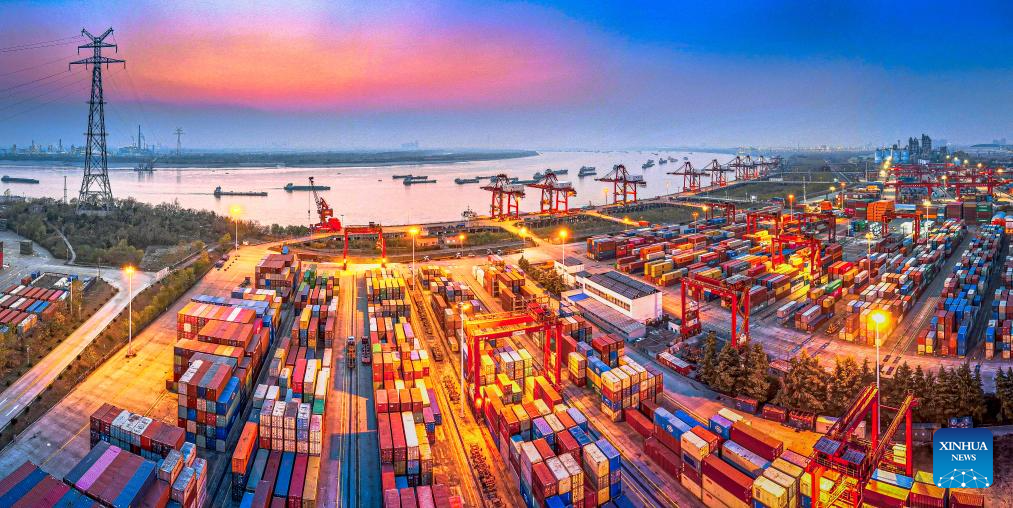




- BRNN
- BRI News
- BRNN News
- Database
Official Documents Polices and Regulations
Inter-government Documents International Cooperation BRI Countries
Business Guide Economic Data BRI Data
Trade
Investment Projects Latest projects
Cases - Content Pool
In early autumn at Yangluo Port in Wuhan, central China's Hubei Province, containers filled with auto parts and electronic equipment were carefully loaded onto oceangoing vessels bound for Northern Europe.
More than three centuries ago, tea from this same region began its journey along an ancient tea road to Europe. Today, modern "Made in Hubei" products are breathing new life into that historic trade corridor.

An aerial drone photo take on Dec. 20, 2024 shows a view of the Yangluo Port in Wuhan, central China's Hubei Province. (Xinhua/Xiao Yijiu)
From the 17th century to the early 20th century, tea grown in Hubei traveled as far as Europe, forming a 14,000-kilometer trade artery. The road also served as a bridge between Eastern and Western civilizations. In 2019, the ancient tea road was included in China's tentative list of World Heritage Sites. The spirit of openness and cooperation it symbolizes is injecting new vitality into economic and trade cooperation between central China and Nordic countries.
In recent years, Hubei's economic and trade cooperation with Sweden, Denmark, Norway, Finland and Iceland has deepened significantly. From January to August 2024, Hubei's trade with the five Nordic countries recorded double-digit growth, with exports of high-tech products surging 113.9 percent year on year. Meanwhile, Nordic businesses have expanded their footprint in Hubei. By August 2024, 41 Nordic enterprises had established operations in the province, bringing total paid-in investment to $630 million, with a focus on strategic emerging industries such as advanced manufacturing and clean energy.
The China-Nordic Economic and Trade Cooperation Forum, jointly launched by China's Ministry of Commerce and the Hubei provincial government in 2018, became permanently based in Wuhan in 2022. At its sixth session in 2024, 109 projects worth more than 156 billion yuan ($22 billion) were signed, covering sectors like new energy and artificial intelligence. In October that year, a store selling quality Nordic products opened in Wuhan, offering local consumers direct access to Norwegian salmon, Swedish vodka and Danish cookies.
An air cargo route between Ezhou and Denmark's Billund, operated by Danish shipping giant Maersk, now handles over 100,000 tonnes annually and serves as a new aerial corridor connecting Asia and Europe.
Policy innovation is further improving the business environment. In 2025, Wuhan rolled out a cross-border trade facilitation program with 21 targeted measures, supporting sectors such as new energy vehicles and cross-border e-commerce. Ezhou Huahu International Airport has opened 45 international and regional cargo routes, while a new model integrating China-Europe freight trains with bonded warehouses is further enhancing its cross-border logistics system.
For Hubei and Nordic countries, cooperation represents both historical continuity and the spirit of a new era of openness.
"The exchanges between Hubei and Nordic countries have deep historical roots. The ancient tea road closely connected us in the past. Today's cooperation carries forward that tradition while contributing to both sides' efforts to build a community with a shared future for humanity," said an official from Hubei's Department of Commerce.
Looking ahead, both sides will continue to leverage the China-Nordic Economic and Trade Cooperation Forum as an open platform, strengthen collaboration in emerging fields like green and low-carbon development and the digital economy, and explore innovative cooperation models to inject new momentum into China-Europe economic and trade exchanges. This economic and trade corridor is writing a new chapter in China-Europe cooperation.

Tel:86-10-65363107, 86-10-65368220, 86-10-65363106